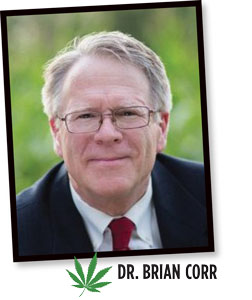9/1/2021
Turning the Pages of the Cannabis Calendar
Dr. Brian Corr

Things were so much simpler when I was younger—like a year ago, when I was a year younger than I am now. Once again, the pages on the cannabis calendar fly by faster than can be imagined and controversies in the cannabis industry are making news.
Not so long ago (late 2018) it seemed there was clarity settling into federal rules and regulations related to cannabis in the United States. If cannabis had a tetrahydrocannabinol (THC) content less than 0.3% it was hemp and could be grown and processed with minimal regulation. Among other things, this allowed for production and sale of cannabidiol (CBD). In contrast, cannabis with a THC content greater than 0.3% was considered by U.S. regulation to be marijuana and therefore federally illegal, though continued to be sold in states that have enacted state-legal legislation.
Life was simple then. Measure the THC and you know if you have hemp or marijuana.
But not so fast—there’s a wrinkle. THC is not simply THC.
There are quite a few (over 100) different cannabinoids found in cannabis. Cannabinoids are the class of compounds found in cannabis (and some other plants) that interact with the endocannabinoid system in humans (and many animals) to produce various effects.
CBD, one of the multitude of cannabinoids in cannabis, has been having its time in the sun. It seems every gas station sells some form of CBD product. Health supplements with CBD are available at Walgreens and CVS. You cannot get more mainstream that that.
And sales of all those CBD products are perfectly okay with U.S. federal regulations. The FDA doesn’t get involved so long as no health benefits are claimed. And the DEA doesn’t get involved if the THC content of a CBD product stays below the regulatory-defined 0.3%.
But while CBD has been enjoying its mainstream acceptance in gas stations and drug stores, another cannabinoid has been sneaking up to take the limelight. And this one has complications.
CBD has been allowed in large part because it doesn’t cause a “high.” The new cannabinoid on the block is controversial in large part because it DOES cause a high, yet is not clearly regulated by existing regulations.
This regulatory wrinkle arises because although a rose is a rose is a rose, THC is not just THC. There are subtly different ways the THC molecule is put together. These different forms of THC are called isomers. All isomers have the same parts, but how they’re put together makes them different.
The most well-known isomer of THC is delta-9-THC. That’s the stuff that’s been getting cannabis users high since time immemorial and for most people is THE THC. The governmental regulators may have thought that way, too, so regulations are ambiguous about different forms of THC.
However, the isomer delta-8-THC is also tetrahydrocannabinol, but with a different location of a carbon double bond in the molecule. The same—but different—and therefore ambiguously regulated.
Delta-8-THC has essentially all the same psychoactive properties of delta-9-THC, but with 50% to 70% less effect when consumed in the same quantity. In other words, it will get a person high, but either not as high or it requires more to have the same effect. Like most things related to cannabis, there’s little research available related to delta-8- THC, but besides the high, it’s also been reported to reduce nausea in cancer patients.
Until recently, delta-8-THC has been mostly just a curiosity because it’s typically found in extremely low levels in cannabis. Most of the excitement has been around delta-9-THC and CBD. However, it’s been known for many years delta-8-THC can be chemically synthesized from CBD. With the glut of CBD currently available and ambiguous regulations surrounding exactly what THC is regulated, it was inevitable we would see delta-8-THC hit the market.
Delta-8-THC products are showing up everywhere. They aren’t at Walgreens and CVS, and probably won’t be due to uncertain legality, but vapes, gummies, edibles and all other sorts of delta-8-THC products are showing up online, and at gas stations and convenience stores.
Besides the controversy of a psychoactive cannabinoid slipping through regulatory cracks, there’s the concern consumers may be at risk from consuming a completely unregulated product. Cannabis products sold through state-legal shops must undergo extensive testing prior to sale to ensure there are no pesticide residues, heavy metals, microbial contamination, etc. Because delta-8- THC is unregulated, no such safeguards are in place. And because synthesis of delta-8-THC from CBD requires use of toxic compounds, there’s a definite risk delta-8-THC products may contain unhealthful contaminants.
Not only are delta-8-THC products not tested for contaminants, they aren’t required to be tested for anything. Recent samples taken from shops selling delta-8-THC products have shown there may be surprises in those products. A recent report showed half of the samples of delta-8-THC products analyzed contained delta-9-THC levels above the legal limit—sometimes by quite a bit—and most had much less delta-8-THC than promised.
What will be the result of this surge of interest in delta-8-THC? Delta-9-THC can also be synthesized from CBD. Will that be the end of growers producing cannabis for delta-9-THC? Probably not because it can easily be extracted from cannabis, so there’s much less incentive to synthesize it, although it’s happening to some degree.
Most likely, the result is going to be a surge of new, carefully worded regulations taking into account different cannabinoids and different methods of creating them. Some states have already crafted new regulations.
And then things will settle down again. But likely only briefly. And pages on the cannabis calendar will continue to fly by. GT
Dr. Brian Corr is a consultant with more than four decades of experience in the greenhouse industry. He has advised legal cannabis producers for the last six years. You can reach him at Brian.Corr@SycamoreHortConsulting.com.